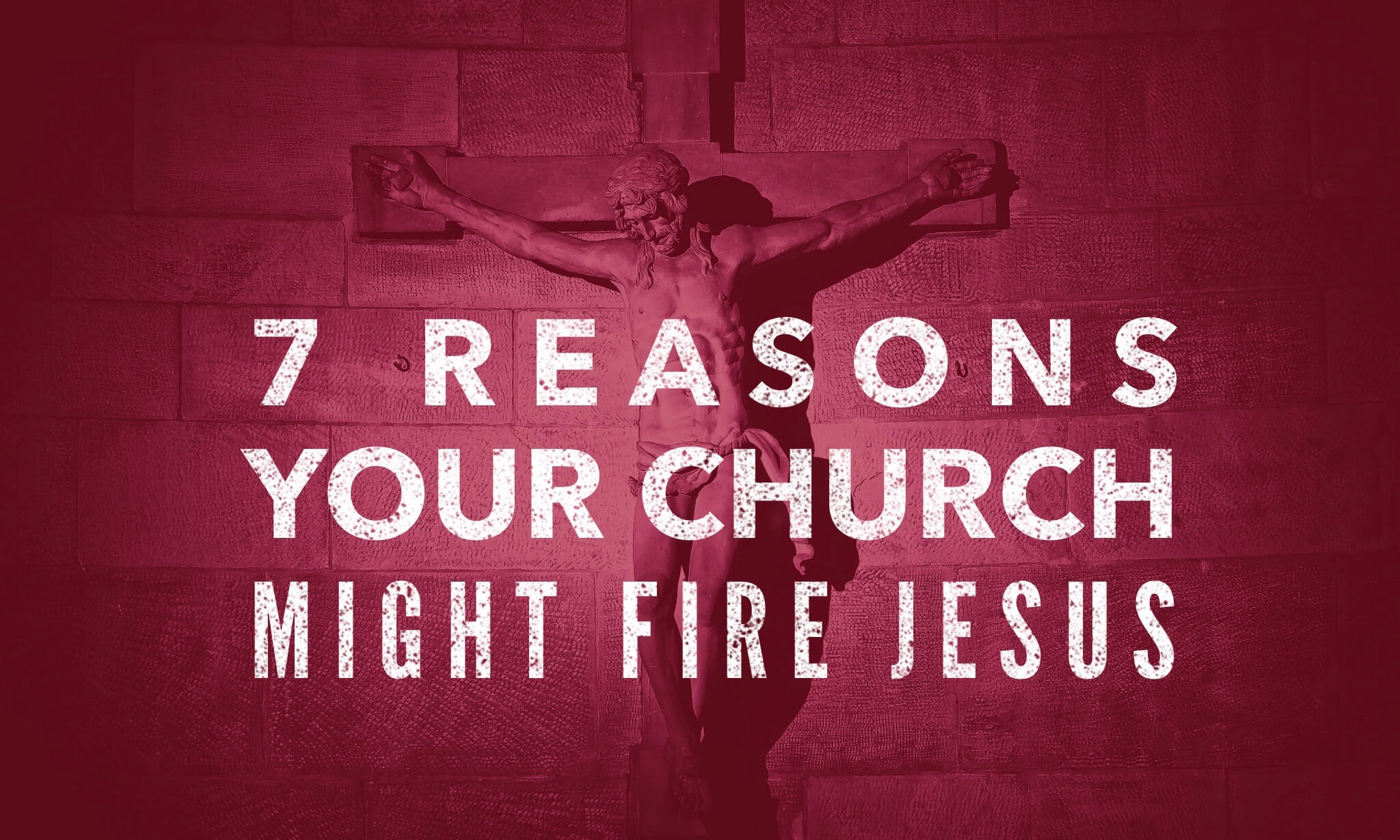7 Reasons Jesus Might Be Fired From Your Church

Some pastors get fired for a good reason. They had a moral failing and no longer lived up to the requirements of 1 Tim 3:1-7.
But I’ve known a lot of faithful men and women working in churches who were let go for lesser reasons.
They…
- Didn’t grow the ministry fast enough.
- Didn’t fit a specific personality profile.
- Had too large of a salary.
- Grew too old.
- Experienced a season of burnout like Elijah (1 Kings 19), and the church said they were “not passionate enough.”
- Weren’t the best friend (or family member) of a new boss.
No pastor is perfect, but good pastors lose their jobs every day. And it hurts. I’ve experienced it too.
So just for fun (and maybe a little therapy), here are seven reasons Jesus might be fired from a church today:
1. Jesus was never in the office.
Jesus was always walking around town talking to people. He never wrote thank you letters or sat at a desk. He did most of his work outside of the church.
How many hardworking pastors have been fired because they weren’t perceived to be working enough since they weren’t sitting at a desk doing their work? Somehow the late night phone calls, early morning breakfast meetings, and weekend hospital visits didn’t count.
2. Jesus drank alcohol.
Jesus drank in public. He drank wine with his disciples. He went to parties where people drank alcohol. On at least one occasion, he even brought the wine. So some people in the church falsely accused him of being a drunkard (Matthew 11:19).
A lot of churches have policies in their employee handbook that prohibit pastors from drinking alcohol. Jesus wouldn’t make the cut.
3. Jesus didn’t align with the vision of church leadership.
Jesus often disagreed with the church leadership. He didn’t execute their vision. He even had the nerve to call them out on their sin (Matthew 23:1-36).
Pastors get fired for much less. Some pastors who publicly show respect for their leaders even get fired for daring to question the vision of the leader privately.
4. Jesus preached too long.
Jesus didn’t set a clock on his preaching. Sometimes he preached too long. People even missed lunch (Luke 9:11-12).
I’m a fan of shorter sermons, but I wonder how many pastors have received a bad mark on a performance review for preaching too long.
5. Jesus broke traditions.
Jesus didn’t always follow tradition. He broke church traditions that weren’t biblical commands. It’s one of the reasons the religious leaders wanted to crucify him (Mark 3:1-6).
If there’s one thing that most churches don’t like change, it’s change. Some will choose their traditions over their pastors. How many pastors have gotten in hot water over a change in the music or even the carpet?
6. Jesus’ numbers went down.
At first, Jesus grew his ministry. But later on, he preached a difficult message, and a lot of people left (John 6:66-67). That would not have looked good on an attendance report.
But many pastors live and die by their numbers. If the numbers are up, they breathe a sigh of relief. If numbers are down, they start updating their resume.
7. Jesus wasn’t married.
OK, maybe a church wouldn’t fire Jesus for this one. But a lot of churches have marriage as a qualification for the job. Just look through postings on church job boards and see for yourself.
By these standards both Jesus and Paul are not qualified enough. It’s not easy for my single pastor friends, especially as they grow older.
Here’s My Point:
Churches need to be careful when pushing pastors out the door.
Unless there is a clear, fireable offense, slow your roll. Don’t make rash decisions.
Firing a pastor is painful. It’s like a divorce. It hurts everyone involved.
It hurts you, the pastor, their family, and the many people in your church who love them.
Before getting a divorce, wouldn’t you do everything you can to make the relationship work? Talk about your problems? Get counseling? See if you can make it work? Allow time for the relationship to heal?
Why not go to the same measures to fix a relationship with a pastor?
Yes, the church is like a business in some ways, but pastors are more than just employees.
Sadly, many corporations often have better policies than churches to protect employees from getting fired without multiple warnings and steps towards reconciliation.
Am I wrong, or are many churches too quick to fire?





